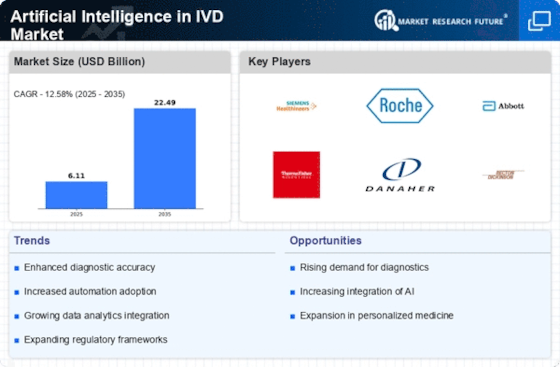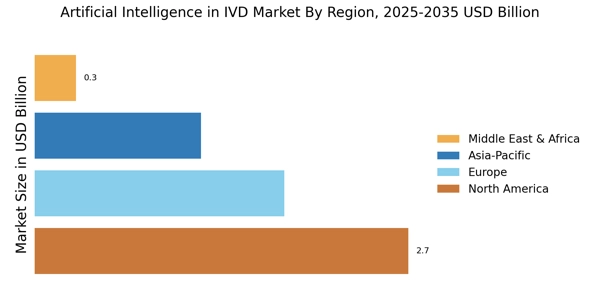Advancements in Data Analytics
Advancements in data analytics are transforming the Artificial Intelligence in IVD Market. The ability to process vast amounts of data quickly and accurately allows for enhanced decision-making in diagnostics. AI systems can identify patterns and correlations that may not be evident to human analysts. This capability is particularly crucial in areas such as genomics and personalized medicine, where tailored treatment plans are becoming the norm. The integration of AI-driven analytics is expected to increase efficiency in laboratories, potentially reducing turnaround times for test results and improving patient outcomes.
Regulatory Support for AI Integration
Regulatory support for the integration of AI technologies is emerging as a crucial driver in the Artificial Intelligence in IVD Market. Regulatory bodies are beginning to establish frameworks that facilitate the approval and implementation of AI-driven diagnostic tools. This support is vital for ensuring safety and efficacy while promoting innovation. As regulations evolve, they are likely to encourage more companies to invest in AI solutions, thereby expanding the market. The establishment of clear guidelines can also enhance public trust in AI technologies, further driving their adoption in the IVD sector.
Rising Demand for Diagnostic Accuracy
The increasing emphasis on diagnostic accuracy is a primary driver in the Artificial Intelligence in IVD Market. Healthcare providers are under pressure to deliver precise and timely diagnoses, which AI technologies can facilitate. AI algorithms can analyze complex data sets, leading to improved detection rates of diseases. For instance, the market for AI in IVD is projected to reach USD 3.5 billion by 2026, reflecting a compound annual growth rate of approximately 40%. This surge indicates a strong market demand for solutions that enhance diagnostic precision, thereby driving investments in AI technologies within the IVD sector.
Growing Focus on Personalized Medicine
The growing focus on personalized medicine is reshaping the landscape of the Artificial Intelligence in IVD Market. As healthcare shifts towards individualized treatment plans, AI technologies are becoming essential in analyzing patient data to tailor diagnostics and therapies. This trend is supported by the increasing availability of genomic data and advancements in machine learning algorithms. The ability to provide personalized insights not only enhances patient care but also drives the demand for AI solutions in diagnostics, as healthcare providers seek to optimize treatment efficacy.
Increased Investment in Healthcare Technology
The surge in investment in healthcare technology is significantly influencing the Artificial Intelligence in IVD Market. Venture capital and private equity funding have been directed towards innovative AI solutions that enhance diagnostic capabilities. In recent years, funding for AI in healthcare has exceeded USD 10 billion, indicating a robust interest in developing technologies that can streamline IVD processes. This influx of capital is likely to accelerate the development and adoption of AI-driven diagnostic tools, thereby expanding the market and improving healthcare delivery.


















